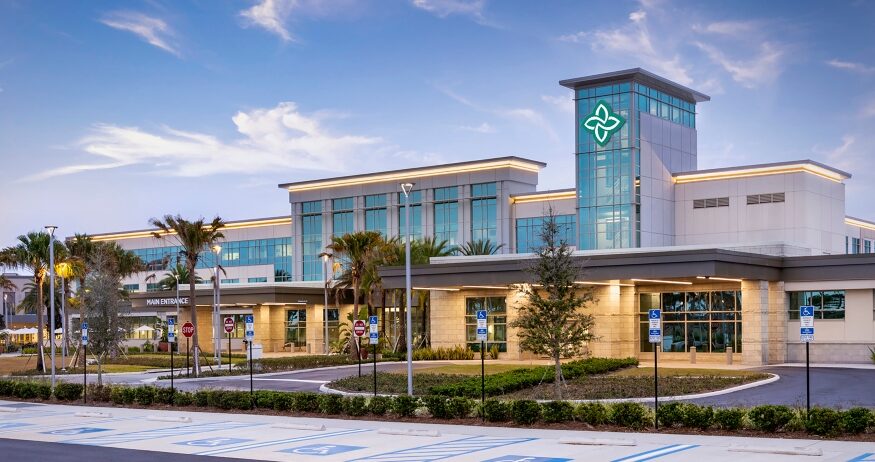New health care operators could move in as South Carolina lifts Certificate of Need regulations
Jenny Peterson //December 20, 2023//

A rendering shows the proposed Trident Health System's proposed hospital in John's Island. (Rendering/Trident Health Center)

A rendering shows the proposed Trident Health System's proposed hospital in John's Island. (Rendering/Trident Health Center)
New health care operators could move in as South Carolina lifts Certificate of Need regulations
Jenny Peterson //December 20, 2023//
Charleston-area health systems are anticipating more competitors coming to the area to build ambulatory and urgent care centers now that the state legislature has lifted a “Certificate of Need” regulatory process required to build most health care facilities in the past.
In 2023, the state legislature voted to repeal the state’s Certificate of Need regulations, eliminating the requirement for most health care facilities to obtain approval from the Department of Health and Environmental Control before building a new facility, purchasing certain medical equipment or providing additional medical services. According to Gov. Henry McMaster, the CON requirement fostered “monopolies” in the health care space.
Under the repeal of the CON, urgent care facilities, ambulatory surgery centers, freestanding imaging centers, birthing centers and hospital relocations can be built without first traversing the CON regulatory process. It also eliminates the CON process for a new hospital in a county that does not currently have one.
The response from the state’s largest health systems has been overwhelmingly positive, however, Kevin Hoak, senior vice president and chief operating officer at Roper St. Francis, said lifting regulations may result in more out-of-state health system operators looking to move into South Carolina.
“In the short term, you could have folks opening ambulatory surgery centers or imaging centers from out of state. And in the long term, you could have other hospitals, or other national health systems, decide they want to come to the region and open up a facility in the state. In hospital care, it’s the last big entry. We expect there to be more folks coming into the market,” Hoak said. “Charleston is a unique market; it’s pretty consolidated around a few health systems and there’s not a lot of availability from a large scale in property (availability). I don’t think you’ll see anything drastically changing in that regard, but you may see that in other areas of the state.”
There are some exceptions to the CON repeal. It does not apply to nursing homes, and until Jan. 1, 2027, applies to building new hospitals in counties that currently have hospitals.
“Making the hospital CON requirement (still in effect until 2027) was because there was so much in the queue that we allowed hospitals to figure out how they were going to operate after the Certificate of Need went away,” said Rep. Sylleste H. Davis (R-Berkeley County), who co-sponsored the bill. “It gives them like a little bit of breathing room and (health systems) asked for that.”
Both Roper St. Francis and Trident Health are planning hospitals in the Charleston area. In the past year, Trident Medical Center submitted a CON for a 50-bed acute care hospital to be located between Maybank Highway and Cane Slash Road on Johns Island.
“We look forward to 2027 when we will be able to expand inpatient beds to better serve our patients and community,” said Landon Smith, Trident Medical Center chief operating officer and interim CEO.
In 2022, Roper St. Francis announced plans for a $1 billion Roper Hospital Medical Campus in North Charleston.
Davis said state lawmakers heard hours of testimony from the state’s largest health systems and providers about the benefits of lifting the CON requirements. She also considered the health care needs of her constituents.
“The hospital most recently built in Berkeley County and opened in 2019 was the first full-service hospital in Berkeley County in 45 years and it had taken almost 20 years to get the hospital through all of the Certificate of Need appeals process,” Davis said. “Shortly after I was elected in 2016, a hospital contacted me and asked me if I would write a letter in support of their application for a Certificate of Need. It was the first time I had heard of this program and since that time, I have been in favor of repealing it.”
Davis said under the new law she expects the state to have more stand-alone surgical centers, mental health hospitals, crisis intervention facilities and drug treatment facilities, and for doctors and health systems to have more freedom to purchase diagnostic equipment.
“In some cases, hospitals and doctors were holding back on things that they knew were needed in the community because it was such a headache and, if a competitor challenged what they were (planning), that could mean legal fees and could drag on for years,” Rep. Davis said. “Everyone was in agreement that we needed a bill that changed the process. I have had legislators in other states contact me and want to sit down and talk about how we (repealed) it in South Carolina because it does seem to stifle the expansion of health care facilities.”
Making health care facilities easier to build
Health system executives say they will continue to expand their facilities to meet the needs of the community — only now at a quicker pace.
“These regulations (had) slowed down projects that we know patients and families are looking forward to using. This allows us to meet our strategic plan in a more timely manner,” said Montez Seabrook, public affairs and media relations coordinator with the Medical University of South Carolina.
Roper St. Francis executives said they had stayed on top of the CON regulations each legislative year.
“We were already in the process of trying to optimize our locations. Luckily, with the CON law changing, we will continue the acceleration forward,” Hoak said.
McMaster stated he believes repealing the CON regulations will result in more affordable health care for all.
When he signed the bill into law in late 2023, the governor stated, “Everyone benefits when the proven power of the free market is unleashed in our state.”
















